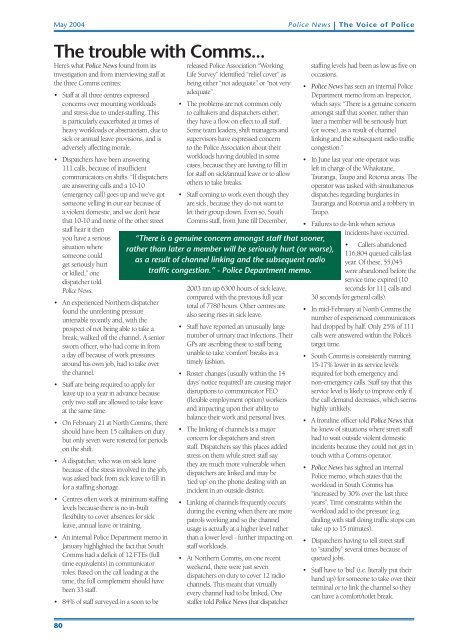Police News May - New Zealand Police Association
Police News May - New Zealand Police Association
Police News May - New Zealand Police Association
You also want an ePaper? Increase the reach of your titles
YUMPU automatically turns print PDFs into web optimized ePapers that Google loves.
<strong>May</strong> 2004 <strong>Police</strong> <strong><strong>New</strong>s</strong> The Voice of <strong>Police</strong>The trouble with Comms...Here’s what <strong>Police</strong> <strong><strong>New</strong>s</strong> found from itsinvestigation and from interviewing staff atthe three Comms centres:• Staff at all three centres expressedconcerns over mounting workloadsand stress due to under-staffing. Thisis particularly exacerbated at times ofheavy workloads or absenteeism, due tosick or annual leave provisions, and isadversely affecting morale.• Dispatchers have been answering111 calls, because of insufficientcommunicators on shifts. “If dispatchersare answering calls and a 10-10(emergency call) goes up and we’ve gotsomeone yelling in our ear because ofa violent domestic, and we don’t hearthat 10-10 and none of the other streetstaff hear it thenyou have a serioussituation wheresomeone couldget seriously hurtor killed,” onedispatcher told<strong>Police</strong> <strong><strong>New</strong>s</strong>.• An experienced Northern dispatcherfound the unrelenting pressureuntenable recently and, with theprospect of not being able to take abreak, walked off the channel. A seniorsworn officer, who had come in froma day off because of work pressuresaround his own job, had to take overthe channel.• Staff are being required to apply forleave up to a year in advance becauseonly two staff are allowed to take leaveat the same time.• On February 21 at North Comms, thereshould have been 15 calltakers on dutybut only seven were rostered for periodson the shift.• A dispatcher, who was on sick leavebecause of the stress involved in the job,was asked back from sick leave to fill infor a staffing shortage.• Centres often work at minimum staffinglevels because there is no in-builtflexibility to cover absences for sickleave, annual leave or training.• An internal <strong>Police</strong> Department memo inJanuary highlighted the fact that SouthComms had a deficit of 12 FTEs (fulltime equivalents) in communicatorroles. Based on the call loading at thetime, the full complement should havebeen 33 staff.• 84% of staff surveyed in a soon to bereleased <strong>Police</strong> <strong>Association</strong> “WorkingLife Survey” identified “relief cover” asbeing either “not adequate” or “not veryadequate”.• The problems are not common onlyto calltakers and dispatchers either;they have a flow on effect to all staff.Some team leaders, shift managers andsupervisors have expressed concernto the <strong>Police</strong> <strong>Association</strong> about theirworkloads having doubled in somecases, because they are having to fill infor staff on sick/annual leave or to allowothers to take breaks.• Staff coming to work even though theyare sick, because they do not want tolet their group down. Even so, SouthComms staff, from June till December,“There is a genuine concern amongst staff that sooner,rather than later a member will be seriously hurt (or worse),as a result of channel linking and the subsequent radiotraffic congestion.” - <strong>Police</strong> Department memo.2003 ran up 6300 hours of sick leave,compared with the previous full yeartotal of 7780 hours. Other centres arealso seeing rises in sick leave.• Staff have reported an unusually largenumber of urinary tract infections. TheirGPs are ascribing these to staff beingunable to take ‘comfort’ breaks in atimely fashion.• Roster changes (usually within the 14days’ notice required) are causing majordisruptions to communicator FEO(flexible employment option) workersand impacting upon their ability tobalance their work and personal lives.• The linking of channels is a majorconcern for dispatchers and streetstaff. Dispatchers say this places addedstress on them while street staff saythey are much more vulnerable whendispatchers are linked and may be‘tied up’ on the phone dealing with anincident in an outside district.• Linking of channels frequently occursduring the evening when there are morepatrols working and so the channelusage is actually at a higher level ratherthan a lower level - further impacting onstaff workloads.• At Northern Comms, on one recentweekend, there were just sevendispatchers on duty to cover 12 radiochannels. This meant that virtuallyevery channel had to be linked. Onestaffer told <strong>Police</strong> <strong><strong>New</strong>s</strong> that dispatcherstaffing levels had been as low as five onoccasions.• <strong>Police</strong> <strong><strong>New</strong>s</strong> has seen an internal <strong>Police</strong>Department memo from an Inspector,which says: “There is a genuine concernamongst staff that sooner, rather thanlater a member will be seriously hurt(or worse), as a result of channellinking and the subsequent radio trafficcongestion.”• In June last year one operator wasleft in charge of the Whakatane,Tauranga, Taupo and Rotorua areas. Theoperator was tasked with simultaneousdispatches regarding burglaries inTauranga and Rotorua and a robbery inTaupo.• Failures to de-link when seriousincidents have occurred.• Callers abandoned116,804 queued calls lastyear. Of these, 55,045were abandoned before theservice time expired (10seconds for 111 calls and30 seconds for general calls).• In mid-February at North Comms thenumber of experienced communicatorshad dropped by half. Only 25% of 111calls were answered within the <strong>Police</strong>’starget time.• South Comms is consistently running15-17% lower in its service levelsrequired for both emergency andnon-emergency calls. Staff say that thisservice level is likely to improve only ifthe call demand decreases, which seemshighly unlikely.• A frontline officer told <strong>Police</strong> <strong><strong>New</strong>s</strong> thathe knew of situations where street staffhad to wait outside violent domesticincidents because they could not get intouch with a Comms operator.• <strong>Police</strong> <strong><strong>New</strong>s</strong> has sighted an internal<strong>Police</strong> memo, which states that theworkload in South Comms has“increased by 30% over the last threeyears”. Time constraints within theworkload add to the pressure (e.g.dealing with staff doing traffic stops cantake up to 15 minutes).• Dispatchers having to tell street staffto “standby” several times because ofqueued jobs.• Staff have to ‘bid’ (i.e. literally put theirhand up) for someone to take over theirterminal or to link the channel so theycan have a comfort/toilet break.80
















